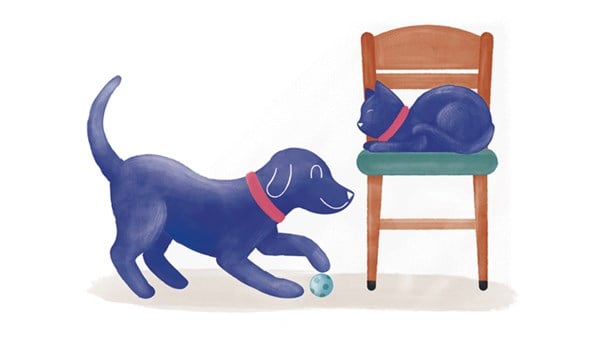What is pet neutering?
Neutering involves the removal of your pet’s internal reproductive organs (ovaries, uterus, testicles) so they won’t be able to breed or get pregnant. Aside from stopping female pets from having litters, it can potentially reduce the risk of both sexes suffering from various health issues.
Neutering will be carried out by your vet under general anaesthetic so your pet will be asleep throughout the procedure. It’s a straightforward process and you can usually take your pet home the same day to recuperate in a familiar, safe environment.
The exact treatment your pet will have will depend on their sex:
- Castration: For male pets, neutering is called castration and typically involves the removal of the testicles, the main source of the hormone testosterone, which reduces the risk of certain cancers and prostate disease
- Spaying: Neutering in female pets is called spaying. Your vet will usually remove both the ovaries and uterus. Sometimes they will remove just the ovaries though this is much less common in the UK. Your vet will explain all the different options open to you
Does my pet need to be neutered?
It’s ultimately up to you whether you want to neuter your pet and your vet can help you decide if it’s in their best interests. It’s really important to consider neutering carefully - while there are lots of benefits there are also some risks and it won’t be the right option for every pet.
Are there any risks when getting my pet neutered?
While modern neutering techniques are very safe, as with any operation there are some risks. The health, age and breed of your pet can also have an impact.
Swelling and some bruising is common. There may be a little bit of bleeding and you may notice the accumulation of fluid or blood around the incision though these normally resolve on their own. There’s a risk of infection or incision breakdown but you can help reduce this by stopping your pet from licking the site and restricting their exercise so they don’t tear or dislodge their stitches.
If you’re worried about anything, speak to your vet.
What’s the best age to neuter my pet?
At Medivet, we will talk to you about the optimum time to neuter based on each individual case but here some general timescales:
Dogs
When to neuter will depend on your pet’s breed, age, sex, temperament and lifestyle. If you don’t have other dogs in your household, are responsible about breeding/not breeding and, for female dogs, are comfortable keeping them away from other dogs when in season, it can be better to leave them intact.
Cats
Cats become sexually mature around five months old, so it’s often recommended to neuter them around four months to prevent unwanted pregnancies and once they’ve had their primary vaccinations. However, it’s perfectly safe to neuter older cats.
Rabbits
Male rabbits can be neutered at three to four months old as soon as their testicles have descended. Female rabbits are slightly later at four to six months when they reach sexual maturity but before their first heat cycle.
Whose responsibility is it to neuter a pet?
It’s entirely up to you, we will simply present you with the benefits, risks and different options, but there are no laws saying you must get your dog, cat or rabbit neutered. If you’re not sure, the best thing you can do is talk it through with your vet who will explain all the risks and benefits and help you come to the right decision for you and your pet.
Frequently asked questions about pet neutering
Who carries out pet neutering?
Neutering is a surgical procedure and will be carried out by a qualified vet under general anaesthetic.
How much does it cost to get my pet neutered?
Vet fees will vary by procedure, breed and sex of your pet. Female spaying tends to be a little more expensive because the procedure is more complex. Your vet practice will explain the fees and talk you through any additional costs.
Will my pet get fat after neutering?
Hormonal changes caused by neutering may affect your pet’s weight. Your vet can advise you on the best diet post-surgery to keep them healthy.








